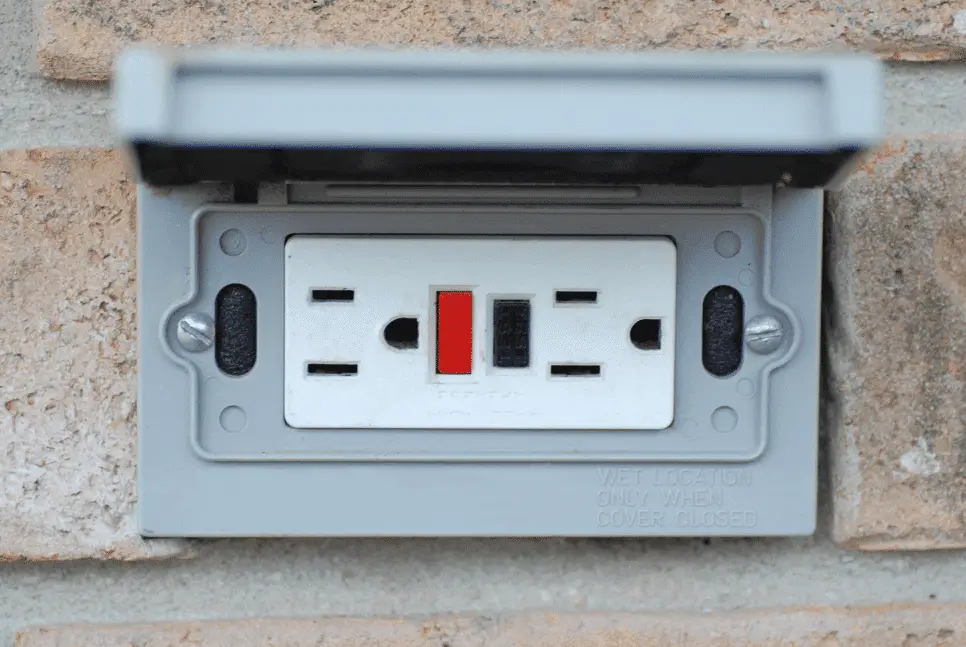Above-ground swimming pools are often installed by do-it-yourselfers. And most who have their pool installed professionally will handle getting the electricity to the new pump themselves.
There are different types of above-ground pools. Some are less than a thousand bucks and require little electricity. Others can approach (or exceed) ten thousand dollars and require a lot more intricate electrical setups.
Regardless of the type of pool, how small it is, or how little you pay for it, it has water and an electric pump, so it needs a GFI
A GFI is a safety feature for an above-ground pool. It helps prevent a power surge or electrical malfunction from potentially electrically charging the pool.
WHAT IS A GFI?
A GFI or “ground fault circuit interrupter” is easiest described as a device within the electric wire that will shut off the flow of electricity if there is a power surge.
If you have ever been in the electric box of your house, you’ll know that is a panel with a bunch of switches with numbers on each one. These switches are called “breakers” and they will also “trip” or turn off the electricity going through them if there is a power surge.

A GFI is the same thing as a breaker. It’s just a mini version of one that only protects one electric line.
WHAT’S THE DIFFERENCE BETWEEN A “GFI” AND A “GFCI”?
Nothing!
As an above-ground pool installer, I’d have to find off-season work every fall and winter. For some years, I was an electrician during my off-season. This is when I learned some about electricity.
Electricians would call a ground fault circuit interrupter a GFI for short but the real acronym for a Ground Fault Circuit Interrupter is GFCI. I guess GFI rolls off our tongues much easier than GFCI does.
Don’t be confused then (as I was in the beginning of my seasonal electrician career) when you go to Home Depot or Amazon looking for a GFI and only can find a GFCI.
WHY IS A GFI IMPORTANT TO HAVE WITH AN ABOVE-GROUND POOL?
There are some things that almost everyone knows. Not mixing water with electricity is one of them. In researching for this article, I found out some strange things about water and electricity. This is a rabbit hole not worth going down here.
What you should know here is that if the electric line running your pool’s pump somehow connects with the water of the pool, then that interaction will cause the GFI to “trip” and stop the flow of electricity.
This is a good thing as electricity connected to water will shock you. In some cases and conditions, it can kill you! And you don’t want that.
By the National Electric Code or NEC, any receptacle that is six feet or less from a water source (sink, bathtub, water appliance) has to be a GFCI (GFI for short). So, if having a GFI is important in kitchens and bathrooms, then that tells you it’s a great idea to have one with the pump connected to your swimming pool.
WHERE TO PUT A GFI INLINE FOR AN ABOVE GROUND POOL
Most all above-ground pool pumps come with just a basic three-prong 120v cord. This is the same cord that a house vacuum, hairdryer, or almost everything with an electric cord that uses 120 volts in the home.
So, wherever the pool pump is placed (which is usually next to the pool), there should to be a waterproof outdoor outlet close enough so the pump can plug into it.
This is where most GFI outlets are installed for above-ground pool pumps. Receptacles with built-in GFIs are typically basic outlets. This means that there are two outlets which is good as you can use one for the pump and the other for any additional pool-related component like pool lighting or a robot pool cleaner.
Pool owners run the needed electricity to the pump in different ways. Some will run an extension cord from their pool pump to the outdoor outlet of the house. Outdoor outlets are usually GFI outlets or at least have another GFI outlet attached to them somewhere else. Moreover, this is another NEC regulation, so if your house is up to code, it will have one at every outside outlet that you might have.
The GFI doesn’t have to be close to the pool. It just has to be inline with the power going from the breaker panel (the house’s power source) to the pool pump somewhere.
Some fancier electrical setups will have the pool pump hard-wired into a small electric panel near the pool. This panel will be an outdoor, waterproof one and may have a timer included. It may also be set up to provide electricity for other components of the pool that need electricity. Usually, a setup like this is done by an electrician.
These panels should absolutely include a GFI. If done by an electrician, it will have a GFI without question as they have to do things to code.
HOW TO KNOW IF YOU HAVE A GFI OUTLET
Ground fault circuit interrupter receptacles have two buttons on the face of the outlet. Regular outlets don’t have buttons. They just have two 3-prong plugs.
One of the buttons on a GFI outlet is to test it. If you press it and the outlet no longer works, then that means the GFI (mini-breaker) inside is doing its job of protecting from a power fluctuation.
Pressing the other button will reset the GFI and the outlet should start working again.
GFI OUTLETS DON’T LAST FOREVER
A GFI outlet is a safety feature. This means that as it ages, it may start tripping as it is designed to either fully protect or not at all.
Lastly, a regular outside outlet in a waterproof box can last for decades. A GFI outlet probably won’t. Don’t be surprised then if an older one acts up and needs replacing. It won’t necessarily mean that someone did something wrong.

I just bought above groung pool and it has this smart plug ans i have the extention cord from the garage to my pool by the porch and the pump wont start working. IT HAS ELECTRICITY THE EXTENTION CORD BUT MY PUMP WONT START IT JIST HAS SOME NUMBERS THAT ARE BLINKING NOT SURE WHAT I NEED TO DO ?
I’m sorry but I don’t think I can help. If the pump has blinking numbers, then it’s got power to it but you have some electronics there. (most AG pumps don’t have electronics). I would read the pump’s owners manual or look for it online.
Hell. did I need a 15 or 20amp gfci. For a above ground pool.
Usually yes